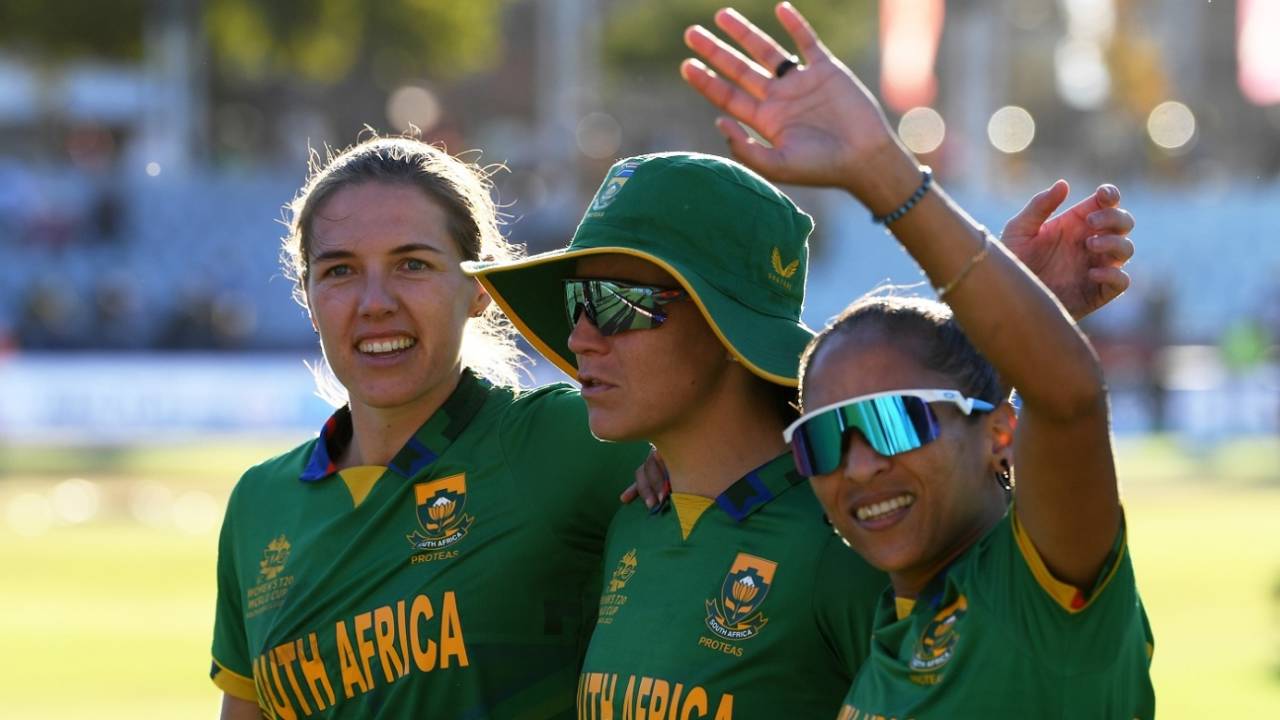South Africa's women's team to get equal match fees as the men
Cricket South Africa also announces a six-team professional domestic system for women
Firdose Moonda
22-Aug-2023
South Africa Women made the final of the T20 World Cup in early 2023 • Getty Images
CSA has announced equal international-match fees for their men and women's players, joining New Zealand and India in establishing parity across genders. The landmark announcement comes on the same day that CSA unveiled a six-team professional domestic system for women cricketers, as part of the legacy projects following the successful hosting of the Women's T20 World Cup in February. The new match fees will be in place from next month, when South Africa's women's team tours Pakistan.
The new domestic structure takes its framework from the existing 16-team, two-tier set-up, which is divided into a top six and a bottom ten, with the latter being split into two groups of five each with a promotion-relegation system in place. The same set-up will continue, but the top-six teams will now have the resources to contract 11 players - up from six in previous years - at pay rates that are on par with the highest-paid male cricketers in Division 2, and will be able to employ a full-time coaching staff. CSA will subsidise four backroom-staff positions for each of the six sides, and require two of them to be female.
The top six teams will compete in a 50-over and a 20-over competition, with the shortest-format matches likely to be played on the same days as the men's competition to increase visibility. Cricket becomes the first team sport in South Africa to professionalise the women's game at domestic level, thus earning the praise of the country's sports minister Zizi Kodwa.
Related
Wolvaardt to test the waters as SA women's team interim captain
Moreeng claims South Africa women's dressing room is not divided
Luus steps down as South Africa captain ahead of Pakistan tour
Moreeng to continue as SA women's coach despite calls for change
Luus calls for CSA to invest in women's cricket after WC final defeat
"What we are celebrating today is not about monetary value but about leadership and political will," Kodwa said at the unveiling of the six teams in Pretoria. "In the first week of our appointment, we met with the top five [sports] federations in the country, and we stressed this point. You seem to be the only federation who understood what we said. How I wish others are listening as we speak now."
For the 2023-24 season, the top six teams will be Titans, Lions, Dolphins, Western Province, Free State and Garden Route Badgers. Four of the six - Titans, Lions, Dolphins and Western Province - also have men's teams in South Africa's domestic first division, while both Free State and Garden Route Badgers are top tier women's teams only.
For Free State, who are based in Bloemfontein, this is particularly significant. They occupy an important geographic area in the country's central region, and have faded into the cricketing periphery in recent years with no team in the men's top division and no SA20 franchise in their area. Garden Route Badgers are located in Oudtshoorn, an inland town in the Western Cape known for ostrich farming, and are exploring the possibility of moving to a stadium in the coastal town of George.
While the top six teams will receive most of the benefits of the new initiative, teams in the bottom ten will also see changes - most notably the increase in fixtures. In previous seasons, those teams competed only against the four other teams in their group; but from this season, they will also play cross-pool matches. CSA is still finalising the logistics of this but it is likely to take a tournament-style approach, with teams based at one venue for a few weeks.
Players from both divisions will also be exposed to elite-level international coaching and talent. This season, CSA is planning camps for women's teams with SA20 sides; next season, the board hopes to have women's exhibition matches in the SA20, and the season after that, it is aiming for a women's T20 franchise league.
This expansion in the women's game is estimated to cost CSA R40 million (approx. US$2.1 million) over three years, but it has received some support from the government to cover the costs. The Department of Sports, Arts and Culture has pledged R15 million (US$800,000) to CSA for the same period.
Firdose Moonda is ESPNcricinfo's correspondent for South Africa and women's cricket

